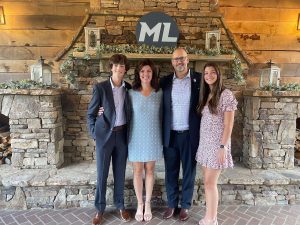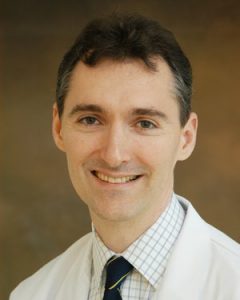Matthew LeMoyne’s parents, Kevin and Anne, say their 14-year-old son lived like he knew something no one else did. He lived large. A high school freshman, Matthew spent his time playing sports or pond jumping with his crew in Milton, Georgia — the self-proclaimed Fishy Fishy Squad.

“Matthew loved every day. And he loved the song ‘Huntin’, Fishin’ and Lovin’ Every Day’ by Luke Bryan,” Kevin explains. “It epitomizes who he was. He just enjoyed the day, and he had a great sense and way about him.”
In 2017, the LeMoynes were busy juggling careers, school, and extracurriculars alongside Matthew and his siblings, older sister Kamryn and younger brother Nate. The kids were thriving, and the family was seemingly healthy.
“Life at that time was extremely normal,” Anne remembers. “Our kids were doing really well. And then suddenly, Matthew passed away in his sleep. To say it was shocking is an understatement, we had no idea what just happened. To our knowledge, he was a perfectly healthy, athletic teenager with no underlying conditions.”
The LeMoynes would later deduce Matthew had long QT syndrome, a genetic arrhythmia that impacts the heart’s electrical system. Shortly after his death, the family underwent electrocardiograms (EKGs) to check for any abnormalities. While Kevin’s and Kamryn’s EKGs came back normal, Nate’s indicated a prolonged QT interval, most often associated with long QT syndrome. Anne’s results also indicated clinical signs of prolonged QT interval — the time it takes for the heart’s electrical system to fire an impulse through ventricles and then recharge.

Long QT is rare. Initial symptoms can be easy to miss, so diagnostic tests and family histories are important in diagnosis. The disease can affect all age groups, but, like other inherited heart diseases, tends to present at an earlier age. Treatment often includes preventative medication, as well as education on what signs to look for and medications to avoid.
“It was a blur. But we knew, A, we had a child who just died in his sleep. And B, we’ve got Nate who has this diagnosis that we don’t understand,” Anne remembers. “You feel helpless.”
To honor Matthew, the LeMoynes founded the Lovin’ Every Day Foundation to help families navigate genetic heart disease diagnoses and fuel cardiac research.
“After Matthew passed, we were so grateful for the kindness we received in the community. Often, kids we didn’t even know, would reach out and say to us, ‘Matthew’s friendship made a difference in my life,’” Anne says. “He was a kind-hearted, humble leader; he was a great friend to all. We want to make a difference while honoring Matthew.”

The foundation recently awarded the Johns Hopkins Division of Cardiology a $10,000 grant to support the work of Andreas Barth, MD, director of the Center for Inherited Heart Diseases. Barth’s work focuses on heart rhythm disorders and inherited heart disease, specifically inherited arrhythmia syndromes, like long QT. The grant will help propel Barth’s current research into the relationship between COVID-19 patients and their QT intervals, which began during the pandemic. Barth and his team have found when COVID patients are admitted to the hospital, their QT interval is significantly prolonged compared to its length when they recover. The funds will also aid in studying protein biomarkers in patients with known life-threatening heart rhythm disorders.
“Philanthropic gifts are incredibly important to supporting research, particularly in the early stages where we have an idea and are doing exploratory work, but we just don’t have enough data to submit a grant to a national foundation, like the National Institutes of Health (NIH),” Barth explains. “We use philanthropy to generate preliminary data.”
Though the foundation’s connection to Barth and his colleagues is still in its infancy, the LeMoynes say they look forward to continuing to build relationships at Hopkins.
“We want to leverage the generosity of our donors to support the work that Hopkins researchers are doing,” Kevin says. “Ideally, we would love for no other family to have to experience what our family has. At Lovin’ Every Day Foundation, in addition to providing AEDs to families in need and providing CPR and AED certification training, advancing cardiac research is a critical piece to complete the puzzle. The further down the road we get, it’s becoming clearer and clearer to us that more needs to be done from a research perspective.”
Topics: Friends of Johns Hopkins Medicine, Johns Hopkins Medicine, Research, Fuel Discovery, Promote and Protect Health